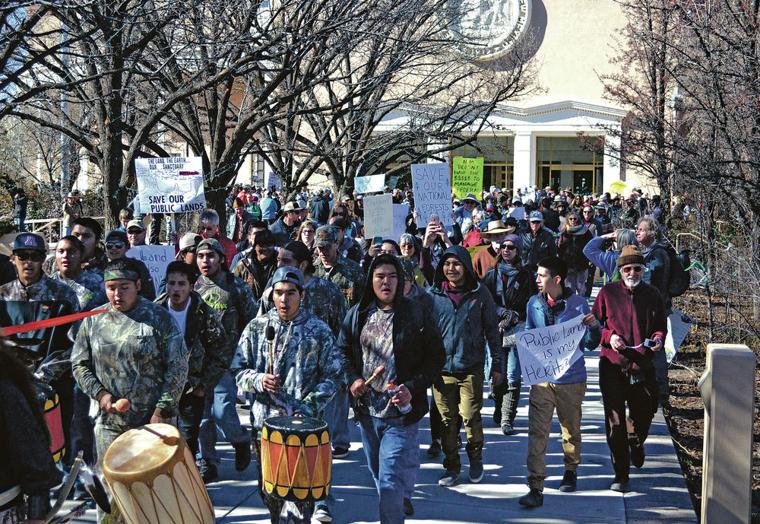The new P and Z Commissioners will be appointed after this ordinance March 2 agenda item is passed.
I think this is more of a legal question about Joann Rouke ousting off the P and Z but especially given that the County is attempting to change and mold the ordinance to their liking and that in doing so they acknowledge their current need to change existing policy not to their liking, it would appear that the P and Z commission would not be able to be retroactively removed by these subsequent changes, unless by this revised method.
Hence, MIke Springfield it appears is attempting to stack the P&Z in favor of the Oil and Gas Industry liking.
Call and Email Tell MIKE Springfield what you think of his schemes and underhanded actions ont he Ordiannces process for this P&Z Commission and the oil and gas ordinance obstructions.
Michael Springfield
Director, Planning & Zoning
Phone: 505-867-7628Email: mspringfield@sandovalcountynm.gov
Members may be removed for cause by a majority vote of the full Board. Cause is undefined here, but it would seem that cause is much more than at will with respect to the existing P and Z members. No matter, the process still must be followed.
- That change is the proposed language that allows a newly elected commissioner to replace “any member appointed by a predecessor.” That really politicizes the P and Z commission. Commissioners are like judges and should not be removed just because someone wins an election. It should not be a spoils system.
- The other change we are against is the ability to appoint a new P and Z commissioner to just fill the remaining term of an open commission seat. It is hard enough to find qualified people willing to serve as a P and Z commissioner. Why tie the hands of the commission to find good people? Who would want to serve a four month term?
There is one change in the proposed ordinance dealing with the appointment of p and Z commissioners that I think needs to be strongly opposed at March 2 meeting.
AT any rate. Please come to testify against these two changes. Hope others will be there as well.
CALL and Email The Sandoval County Commissioners
District
|
Sandoval
County Commission
|
Email
|
Phone
|
|
3
|
Don
Chapman
|
dchapman@sandovalcountynm.gov
|
+15054146247
|
|
4
|
David Heil
|
dheil@sandovalcountynm.gov
|
+15052526085
|
|
2
|
Jay Block
|
jBlock@sandovalcountynm.gov
|
+15052526218
|
|
1
|
James
Dominguez
|
jdominguez@sandovalcountynm.gov
|
+15052523251
|
|
5
|
Kenneth
Eichwald
|
keichwald@sandovalcountynm.gov
|
+15052527412
|
Tell the Commissioners
- To Stop Mike Springfield (Sandoval County Planning Director) from politicizing judges (commissioners) on the P&Z Commission
- To stop the vote and language on the Replacement of any member appointed by a predecessor must be stricken for the ordinance.
- This smacks of corruption as the County is attempting to change and mold the oil and gas ordinance to their liking and that of the oil and gas industry.
Suggested letter to the Commissioners
I am writing about proposed changes to the Planning and Zoning Commission Ordinance.
I have spoken before about the ambiguity of the current Ordinance. However, I have concerns about the revised Draft.
The current Ordinance calls for P&Z Commissioners to serve staggered terms. This makes sense in that there should be some experienced Commissioners at all times.
I suggest that the Ordinance contain a schedule of Commissioner Year of Expiration by District.
Since District 1 and District 5 are assigned to have 2 Commissioners, one term should expire in an odd year and the other in an even year. Districts 2,3 and 4 should be assigned expirations with 2 odd, 1 even or 2 even, 1 odd year as to best fit the current assignments.
Historically, the P&Z Commission has had a number of open positions as filling some spots has been problematic. When a position becomes open because of a resignation or other reason, a replacement should be appointed for a minimum term or one year, but up to two years. This would give a new member time to get “up to speed” to do an effective job.
I believe the P&Z Commission should be as apolitical as possible. Members should be appointed for their willingness to serve with consideration of their background experience. I object to: “A newly elected or duly appointed commissioner may, in his or her sole discretion and within 90 days of taking office, choose to replace any member appointed by a predecessor”.
This, in my mind, politicizes the P&Z Commission. The provision “Members may be removed for cause….etc. should be the only reason for removing/replacing a P&Z Commissioner.
Regards,
Heads Up on the P&Z Commission Changes at tthe Sandoval county Commission this week March 2 for Sandoval County 6 pm


